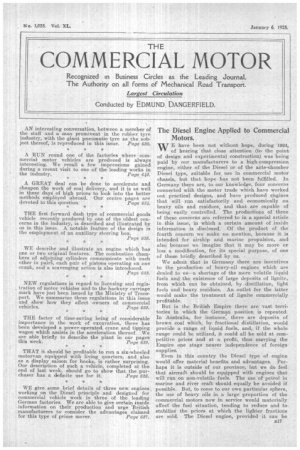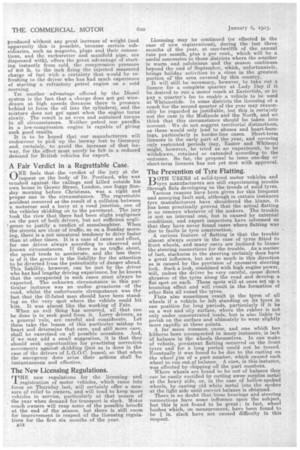The Diesel Engine Applied to Commercial Motors.
Page 1

Page 2

If you've noticed an error in this article please click here to report it so we can fix it.
WE have been not without hope, during 1924, of hearing that close attention (to the point of design and experimental construction) was being paid by our manufacturers to a high-compression engine, either of the Diesel or of the ante-chamber Diesel type, suitable for use in commercial motor chassis, but that hope has not been fulfilled. In Germany there are, to our knowledge, four concerns connected with the motor trade which have worked out practical designs, and have produced eiagines that will run satisfactorily and economically on heavy oils and residues, and that are capable of being easily controlled. The productions of three of these concerns are referred to in a special article in this issue, in which a certain amount of inside information is disclosed. Of the product of the fourth concern we make no mention, because it is intended for airship and marine propulsion, and also because we imagine that it may be more or less a modification, for its special purpose, of one of those briefly described by us.
We admit that in Germany there are incentives to the production of heavy-oil engines which are denied to us--a shortage of the more volatile liquid fuels and the existence of large deposits of lignite, from which can be obtained, by distillation, light fuels and heavy residues. An outlet. for the latter would make the treatment of lignite commercially profitable.
But in the British Empire there are vast territories in which the German position is repeated. In Australia, for instance, there are deposits of brown coal which, by fractional distillation, would provide a range of liquid fuels, and, if the whole range could he utilized, it could all he sold at competitive prices and at a profit, thus carrying the Empire one stage nearer independence of foreign supplies.
Even in this country the Diesel type of engine would offer material benefits and advantages. Perhaps it is outside of our province, but we do feel that aircraft should be equipped with engines that will run on non-volatile fuels. The use of petrol in marine and river craft should equally be avoided if possible. But, to come to our own particular sphere, the use of heavy oils in a large proportion of the commercial motors now in service would materially affect the fuel situation, tending to reduce and to. stabilize` the prices at which the lighter fractions are sold. The Diesel engine, provided it can be produced without any great increase of weight (and apparently this is possible, because certain subsidiaries, such as magneto, plugs and their connections, and the carburetter and manifold pipe, are dispensed with), offers the great advantage of starting instantly from cold, the compression pressure of 900 lb. to the inch firing the injected measured charge of fuel with a certainty that would be refreshing to the driver who has had much experience of starting a refractory petrol engine on a cold morning. Yet another advantage offered by the Diesel system is the fact that a charge does not got wiredrawn at high speeds (because there is pressure behind to force the oil into the cylinders), and the mixture does not get upset when the engine turns elowly. The result is .an even and sustained torque in• all circumstances. Neither petrol nor paraffin in a low-compression engine is capable of giving such good results.
It is to be hoped that our manufacturers will endeavour to pick up the leeway lost to Germany and, certainly, to avoid the increase of that leeway, for the .effect must surely be felt in a reduced demand for British vehicles for export.
A Fair Verdict in a Regrettable Case.
ONE feels that-the verdict of the jury at the inquest on the body of Dr. Pentland, who was rushed against the railings and killed outside his own house in Gower Street, London, one foggy Sunday morning before Christmas, was a right and proper one in the circumstances. The regrettable Accident occurred as the result of a collision between a motorcar and a lorry at a road junction, one of the vehicles skidding on to the pavement. The jury took the view that there had been slight negligence on the part. of both drivers, but not sufficient negligence to justify a verdict of manslaughter. When the streets are clear of traffic as on a Sunday morning, there is a not unnatural tendency to drive faster than at other times. It is a case of cause and effect, for one drives always according to observed and known circumstances. If there is no traffic about, the speed tends to accelerate, and the less there is of it the greater is the liability for the attention to be diverted from the potentiality of danger ahead. This liability, however, can be met by the driver who has had lengthy driving experience, for he knows that the unexpected in such cases must always be expected. The unknown circumstance in this particular instance was an undue greasiness of the road, whilst the unfortunate circumstance was the fact that the ill-fated man should have been standing on the very spot where the vehicle could hit him. It was almost like the working of Fate. When an evil thing has occurred, all that can be done is to seek good from it. Lorry drivers, as a general -rule, are careful and considerate. Let them take the lesson of this particular mishap to heart and determine that care, and still more care, shall be exercised on all possible occasions. And, if we may add a small suggestion, it is that they should seek opportunities for practising corrective movements against skidding (just as is done in the case of the drivers of L.G.O.C. buses), so that when the emergency does arise their actions shall be instantaneous and effective.
The New Licensing Regulations.
fr HE new regulations for the licensing and
registration of motor vehicles, which came into force on Thursday last, will certainly offer a measure of relief to owners, and will tend to keep more vehicles in service, particularly at that season of the year when demand for transport is slack. Motor • coach owners will reap some of the possible benefit at the end of the season, but there is still room for improvement in respect of the licensing regulations for the first six months of the year. 1318
Licensing may be continued (or effected in the case of new registrations), during the last three months of the year, at one-twelfth of the annual rate per month, plus 5 per cent., which will be a useful concession in those districts where the weather is warm and salubrious and the season continues beyond the end of September, which, unfortunately, brings holiday activities to a close in the greatest portion of' thearea covered by this country. It will still be necessary, however, to take out a licence for a complete quarter at Lady Day if it be desired to run a motor coach at Eastertide, or to pay a quarter's fee to enable a vehicle to be used at Whitsuntide. In some districts the licensing of a coach for the second quarter of the year may reasonably be regarded as justifiable, but this is certainly not the case in the Midlands and the North, and we think that this circumstance should be taken into account. We do not suggest territorial distinctions, as these would only lead to abuses and heart-burnings, particularly in border-line cases. Short-term licences in the early part of the year, and covering only restricted periods (say, Easter and Whitsun) might, however, be tried as an experiment, to be withdrawn, retained or extended according to the outcome. So far, the proposalto issue one-day or short-term licences has not yet met with approval.
The Prevention of TNre Flatting.
J30TH USERS of solid-tyred motor vehicles and tyre manufacturers are still experiencing trouble .through flats developing on the treads of solid tyres. Various reasons have been given for this frequent and annoying fault and, although in certain instances tyre manufacturers have shouldered the blame, it has been practically proved that the actual flatting is no concern whatever of the makers. The trouble is not an internal one, but is caused by external conditions, and expert inspectors have informed us that they have never found cases where flatting was due to faults in tyre construction. A curious feature of flatting is that the trouble almost always occurs in the case of tyres fitted to front wheels, and many users are inclined to blame the steering connections for the trouble. As a matter of fact, slackness in the steering certainly does have a great influence, but not so much in this direction as is caused by the provision of excessive steering lock. Such a lock, combined with high engine power, will, unless the driver be very careful, cause direct abrasion of the tyres along the road and develop a flat spot on each. These spots will at once set up a bouncing effect and will result in the formation of other flats all round the tyres. Flats also sometimes result in the tyres of all wheels if a vehicle be left standing on its tyres in one position for long periods, particularly if it be on a wet and oily surface, where the rubber is not only under concentrated loads, but is also liable to perish on the surface and ultimately to wear slightly more rapidly at these points. A far more common cause, and one which has hitherto been unsuspected in many instances, is lack of balance in the wheels themselves. In one make of vehicle, persistent flatting occurred on the front tyres and for a long period could not be traced. Eventually it was found to be due to the casting on the wheel rim of a part number, which caused each wheel to run out of balance. A cure, in this instance, was effected by chipping off the part numbers. Where wheels are found to be out of balance they can be easily rectified by cutting away surplus metal at the heavy side, or, in the case of hollow-spoked wheels, by casting old white metal into the spokes at the light side until correct balance is obtained. There is no doubt that loose bearings and steering connections have some influence upon the subject, but this is not found to be great ; in fact, wheel bushes which, on measurement, have been found to
be in. slack have not caused difficulty in this respect.




























